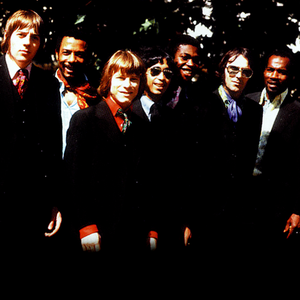As I’ve written many times in this column, soul can come from anywhere and in a variety of forms. This week I’m featuring a multiracial band from England that scored two of the most indelible hits of the ’60s.
The Foundations featured horn players from the West Indies, a few white British musicians, and a Sri Lankan. They were certainly racially diverse but that wasn’t their only distinction. The lineup was also diverse in terms of the ages of the members which ranged from the 18-year-old drummer Tim Harris to the 38-year-old sax player Mike Elliott. The rest of the lineup included sax player Pat Burke, trombonist Eric Allandale, guitarist Alan Warner, bass player Peter Macbeth, keyboard player Tony Gomez, and lead vocalist Clem Curtis.
The Foundations got together in London in 1967. Things weren’t easy at the beginning. They ran a place called the Butterfly Club where the cooked, cleaned, slept, and rehearsed. They derived their name from the basement rehearsal space in the club. Their break came one night when they were playing at the Butterfly and a record dealer named Barry Class came in. Class liked what he heard, signed on as the Foundations manager, and got them an audition with Pye Records.
Tony McCauley was a producer and songwriter at Pye and he was looking for a new act. He had written a song with his partner John Macleod and when he heard the Foundations he thought that the song just might be right for them. That song was “Baby, Now That I’ve Found You” and McCauley’s instinct was dead on, although that wasn’t apparent at first.
Pye released “Baby, Now That I’ve Found You” in the summer of 1967 and it was an immediate … flop. No one paid any attention to the record. At the time, pirate radio was very popular in the UK, siphoning off listeners from the BBC. The BBC decided to combat the pirates by playing records that the pirate stations weren’t playing. One of those records was “Baby, Now That I’ve Found You” and when BBC Radio 1 added it to their playlist the record raced up the charts. By November of that year, “Baby, Now That I’ve Found You” was the #1 single in the UK.

As it turned out, the Foundations had it all. Not only were they the first multiracial group to have a #1 hit in the UK, many people thought that they were the first British group to come up with an authentic soul sound. The fact that their live show revealed that they were a well-rehearsed, tight, entertaining band didn’t hurt either.
Uni Records, an imprint of MCA, released “Baby, Now That I’ve Found You” in the US where it streaked up the charts to #11 and sold three and a half million copies. Suddenly, the Foundations success was worldwide. Unfortunately, the follow-up single, “Back On My Feet Again,” didn’t make it into the British Top 10 and barely crept into the US Top 50. The lack of success of the second single, along with McCauley’s refusal to let the Foundations record their own songs, led to the beginning of problems between the band and the producer. At the same time, Curtis began to feel that some members of the band were resting on their laurels and not putting in the same effort that got the band to the top of the charts. That frustration led him to leave the Foundations for a solo career. Around this time, Mike Elliott also quit the band.
Curtis was replaced by Colin Young. Elliott was not replaced. That’s Young singing lead on “Build Me Up Buttercup” which topped the US charts and peaked at #2 on the UK charts in early 1969. The song was written by McCauley and Mike D’Abo and it was the biggest hit of the Foundations career. The song has remained in our consciousness for nearly 50 years now. A follow-up called “In the Bad, Bad Old Days (Before You Loved Me)” was a respectable hit but certainly not on the same level as “Build Me Up Buttercup.”
The beginning of the end for the Foundations came when McCauley left Pye Records and the band was suddenly without their hit-making songwriter. That combined with the changing nature of soul music in the late-’60s and early-’70s (with James Brown leading the charge to a harder, funkier sound) made it difficult for the Foundations to fit in. They broke up in 1970, just one year after their massive hit “Build Me Up Buttercup.”
A few years later, Curtis decided to revive the band, but so did Young. The result was two groups of Foundations, confusing everyone. Inevitably it ended up in court where it was decided that Curtis could call his band the Foundations while Young would call his the New Foundations. That didn’t exactly clear things up. Curtis continued to tour into the 21st century with Clem Curtis and the Foundations. Meanwhile, original guitarist Alan Warner has been out there with Alan Warner’s Foundations.





Comments